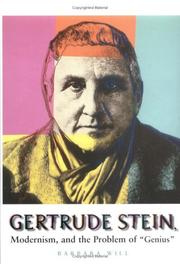| Listing 1 - 2 of 2 |
Sort by
|
Book
ISBN: 1283300680 9786613300683 0231526415 9780231526418 9780231152624 0231152620 0231152639 Year: 2011 Publisher: New York : Columbia University Press,
Abstract | Keywords | Export | Availability | Bookmark
 Loading...
Loading...Choose an application
- Reference Manager
- EndNote
- RefWorks (Direct export to RefWorks)
In 1941, the Jewish American writer and avant-garde icon Gertrude Stein embarked on one of the strangest intellectual projects of her life: translating for an American audience the speeches of Marshal Philippe Pétain, head of state for the collaborationist Vichy government. From 1941 to 1943, Stein translated thirty-two of Pétain's speeches, in which he outlined the Vichy policy barring Jews and other "foreign elements" from the public sphere while calling for France to reconcile with Nazi occupiers.Unlikely Collaboration pursues troubling questions: Why and under what circumstances would Stein undertake this project? The answers lie in Stein's link to the man at the core of this controversy: Bernard Faÿ, Stein's apparent Vichy protector. Faÿ was director of the Bibliothèque Nationale during the Vichy regime and overseer of the repression of French freemasons. He convinced Pétain to keep Stein undisturbed during the war and, in turn, encouraged her to translate Pétain for American audiences. Yet Faÿ's protection was not coercive. Stein described the thinker as her chief intellectual companion during her final years. Barbara Will outlines the formative powers of this relationship, noting possible affinities between Stein and Faÿ's political and aesthetic ideals, especially their reflection in Stein's writing from the late 1920s to the 1940s. Will treats their interaction as a case study of intellectual life during wartime France and an indication of America's place in the Vichy imagination. Her book forces a reconsideration of modernism and fascism, asking what led so many within the avant-garde toward fascist and collaborationist thought. Touching off a potential powder keg of critical dispute, Will replays a collaboration that proves essential to understanding fascism and the remaking of modern Europe.
Politics and literature --- History --- Faÿ, Bernard, --- Stein, Gertrude, --- Staĭn, Gertruda, --- Stein, Gertruda, --- Friends and associates. --- France --- Intellectual life --- Fay, Bernard,

ISBN: 0748699341 0585441847 9780585441849 9780748699346 0748611983 9780748611980 Year: 2000 Publisher: Edinburgh Edinburgh University Press
Abstract | Keywords | Export | Availability | Bookmark
 Loading...
Loading...Choose an application
- Reference Manager
- EndNote
- RefWorks (Direct export to RefWorks)
GBS_insertPreviewButtonPopup('ISBN:9780748611980);Gertrude Stein frequently called herself a genius, but what did this term really mean for her? Stein's claims to genius are legendary, appearing frequently throughout her texts and public lectures. Were they the signs of excessive egotism, of desperate self-advertisement, or of something else entirely? This book examines the centrality and the specificity of the idea of 'genius' to Stein's work and to the aesthetic ideals and contradictory intellectual affiliations of high modernism in general. Through a chronological reading, it maps Stein's move from an early investment in an essential and essentializing notion of 'genius' to her later use of the term to describe an anti-essentialist, democratic textual process. It considers how this revisionary idea of 'genius' came to correspond with Stein's identification of herself as Jewish, queer and American. And it ends with Stein's seemingly paradoxical decision to call a text about being a genius in America, Everybody's Autobiography. Drawing upon a wide range of literary theory, cultural criticism and historical evidence, and offering new readings of previously unexamined texts by Stein, Barbara Will challenges received understandings of Stein's claims to 'genius' and of modernist literary hermeticism by reconceptualising the textual practice of this exemplary modernist writer.Key FeaturesA scholarly study of a writer who is receiving ever-increasing critical attentionThe first major scholarly study to deal with Gertrude Stein's central claim to being a geniusOffers new insight into debates over modernism, mass culture, and postmodernismCombines a historical approach with a theoretical reading inflected by postmodern thinkingOriginal, theoretically informed and consistently well-written.Gertrude Stein, Modernism, and the Problem of 'Genius' was winner of the Choice Outstanding Academic Title award in 2001."
Genius in literature. --- Modernism (Literature) --- Stein, Gertrude, --- Staĭn, Gertruda, --- Stein, Gertruda, --- Criticism and interpretation.
| Listing 1 - 2 of 2 |
Sort by
|

 Search
Search Feedback
Feedback About UniCat
About UniCat  Help
Help News
News